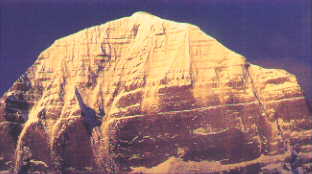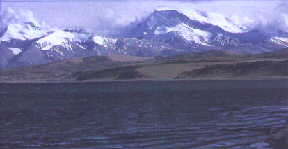| | ||
| |
|
|
|
|
Kailash-Manasarovar Yatra - A Challenging Pilgrimage -R M Nair NEW DELHI: Kailash-Manasarovar is a fascinating geological spectacle. A trip to the high spot in the Himalayas is the most challenging trekking expedition. It is the `ultimate' in Hindu pilgrimage too.
The
Ministry of External Affairs organises the Kailash-Manasarovar
pilgrimage
from June to Sept. One should have attained the age of 18 years to apply. Because
of the rush, those who have once visited the mount are advised to give way to
fresh applicants. The Government-organised yatra takes 26 days - 18 days on foot.
The Kailash-Manasarovar
yatris
holding passports have to complete visa formalities and medical check-ups. For
this purpose an extra four days' stay is required in New Delhi. For the year 2003,
16 batches of 44 pilgrims each were scheduled. The first batch was to leave New
Delhi on May 30, 2003. Risks from altitude sickness and natural calamities have to be taken care of. The Kailash-Mansarovar yatra involves trekking at altitudes of up to 19,500 ft. Those suffering from high blood pressure, diabetes, asthma, heart disease, epilepsy etc are advised not to undertake the yatra. The applicants have to submit a medical certificate. The applications are submitted to the Under Secretary (China), Room No 271(A), South Block, Central Secretariat, Ministry of External Affairs, New Delhi-110 011. The applications for 2003 were accepted up to March 14. An amount of about Rs 46,000 will have to be paid towards yatra arrangements like transport, food, accommodation, medical check-up, visa etc. This does not include any extra personal expenditures like hiring a pony or shopping in China. Said to be the abode of Lord Shiva, Kailash-Manasarovar represents the Indian philosophy of Shiva-Shakthi. The yatra ends with the parikramas of the Kailash Mount and the Mansarovar lake. While for the Hindus it is the abode of Lord Shiva, for Buddhists Kang Rinpochhe or Kailash is the centre of the universe where their god Demchhong resides. It's also a holy place for the Jains whose first Tirthankara, Adinath Rishabnath, attained salvation here. They call the region Ashtapad. The Kailash-Manasarovar pilgrimage of the year 2000 was planned to come to a close with the last batch of yatris returning on October 2. The first batch of 560 pilgrims began its journey on June 2 and was scheduled to return on June 28. Keeping in view the Malpa tragedy, the Kailash-Mansarovar yatris were provided with modern communication gadgets. Besides, two helicopters were also arranged to stand by in the hills of Gala and Hunji. And, Malpa has been taken out of the list of halting points. The yatris will now on take a break at Gala. Each pilgrim will be insured for hospitalisation claims and life. Apart from full-fledged hospitals at Pithoragarh, medical facilities have been arranged at Gala, Bundi, Gunji and Dharchula. The Kailash-Manasarovar yatris this time round are carrying metallic i-cards. The Kailash-Manasarovar yatra route is New Delhi-Kathagodam-Bageshwar-Dharchula-Mangti. The trekking starts from Mangti. The ITBP, BRO, PWD, Kumaon Mandal Vikas Nigam, officials in the China division of the External Affairs Ministry in New Delhi, Pithoragarh district administration - are all engaged in making arrangements for a smooth yatra.
|
Tourist
offices
|
| |
Home
Contact Us
NOTE:
Free contributions of articles and reports may be sent to editor@indiatraveltimes.com
DISCLAIMER
All Rights Reserved ©indiatraveltimes.com


